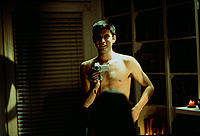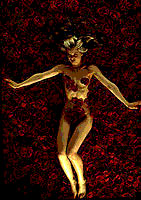
American Beauty
TM & © 1999 Dreamworks LLC
Photo: Lorey Sebastian
courtesy Universal International Pictures BV

|
What happens when new neighbors move in next door? This film
shows one possible answer to that question, but more importantly,
and much more to the point, it shows the reawakening of a
deadened spirit and a revitalization of life. This movie deals with
and delves deeper into the American Dream (anno MM), the sham
and the reality of middle-class life, and the values that surround
lifestyles. It's deep; it's to the bone; it's funny (with seriously dark
edges surrounding it).
Lester Burnham (Kevin Spacey) lives on a tree-lined street in
suburbia with all the popularly prescribed attributes for an ideal life.
This was supposed to be paradise. He introduces us to his staid
lifestyle and comments upon the developments which are about to
be shared onscreen while informing us that within a year of the
story's departure, he will be dead. He and his wife Carolyn
(Annette Bening) live together with their daughter, Jane (Thora
Birch), in a comfortable home very similar (yet superior) to the type
which Carolyn sells to other desirous suburbanites and which
happily returns her and earns her a decent income. She wears
matching dress and gloves to attend to her gardening; pruning the
rosebushes and cutting away the roots of the Sycamore tree next
door. The Fitts family are the neighbors who have recently moved
in next door. Jim (Scott Bakula) and Jim (Sam Robards) are the
gay couple living across the other side of the Burnham yard. All in
all, it might appear to be an ideal, modern street in contemporary
America, but there are aspects in most of their lives that the
residents would preferably (in accordance with their own "ideal"
images) deny or ignore. The glamour and gloss of these images
will be removed sufficiently for us to see the American primitive
hidden underneath.
American Beauty
TM & © 1999 Dreamworks LLC
Photo: Lorey Sebastian
courtesy Universal International Pictures BV

|
For the most part, we are concerned with two households: the Fitts
household is somber and enjoys no pretence to hide its hard edge;
the Burnham household seems light and joyous while ignoring
problems, acting carefree and barging onward. As the movie
begins, their situations are about to change radically
Lester Burnham speaks honestly from the very start, when he draws
the home picture for us and simultaneously admits that his most
enjoyable moment of the day takes place while masturbating in the
shower. Carolyn is frustrated at contending with her male
competition, the "king of real estate", Buddy Kane (Peter Gallagher).
She rushes around, furiously preparing her real estate locations;
cleaning and vacuuming every inch dressed in the skimpy slip which
helps keep her clothes spotless and her public appearance
immaculate. Jane moves quietly between her unfamilial
surroundings, only really enjoying the friendship of her blonde
cheerleader schoolmate Angela (Mena Suvari) who, inadvertently,
is about to become the sexual fixation of her father. Is this beautiful
and innocent teenager, who wants to become a model and have the
world at her feet, the American Beauty of the title? Yes, but only
one. The title refers ambiguously to several different elements
found within the film, sometimes sensitively proffered and
sometimes cynically shoveled. It is the teenage girl, but it is also
the roses that abound (being, after all, the name of one particular
sort of rose), the lifestyle and the houses, the relationship between
Jane and Ricky, Jane herself, the feeling Lester has when he
makes a self-sacrifice, the idealization of muscle, the idealization of
breasts, the idealization of the physical, and the idealization of all
that is superficial, as well as all that is deep. It refers to much found
within the film. Above all, however, it is probably most importantly
and most poignantly encompassed in the somewhat variant
descriptions made separately by Lester and by Ricky when they
refer to the feelings they have in their hearts at special times.
Moments of depth grow like odd wildflowers among the perfect
weeds in this suburban garden.
Colonel Fitts (Chris Cooper) does his best to run a tight ship, has
forced his son, Ricky (Wes Bently), through the mental institution
while his demure wife, Barbara (Allison Janney), only seems
capable of contending with life once assisted by mother's little
helpers. This home abounds in and suffers from repression,
suppression, condemnation, confusion, and denial, among other
delightful aspects found floating around the sphere of relations. The
Colonel doesn't like locked doors inside his house and he doesn't
like fags. He doesn't like drugs either and he intends to do
everything necessary to prevent his son from ever using them
again. Ricky, however, supports his video habit with the income of
his lucrative dealership, which, as fate would have it, boasts some
pretty useful clients. Those short on dough can always supply other
services that might prove useful. One of the many unobtrusive
open questions (i.e. don't ask, don't tell) insinuated in the story
concerns the source of his special G-13 governmental genetically
manipulated grass. Ricky wouldn't be caught dead smoking
anything else (except by his father). When rock-faced Ricky first
appears on the scene, he is seen constantly shooting tape of Jane
as she moves about the street or shelters inside her house. One
could easily assume that he's a potential psychotic personality, an
obsessive-compulsive, or, at very least, a little bit on the strange
side. As the story continues, his character becomes clearer and
we are slowly given an inkling of what really goes on inside the
boy's head.
The way the Burnhams ignore Jane shows exactly how they expect
an ideal family should behave. Following her cheerleading
performance, her mother proudly tells her that she "didn't screw up
once" while dad's eyes and mind get latched once again onto the
blonde angel who was earlier dancing at the end of the leg-kicking
row. Lester's fantasy image of Angela among a bed of deep red
roses, which he vividly visualizes on his bedroom ceiling, reminds
one unmistakably of the (for its time) infamous calendar portrait of
Marilyn Monroe; yet another American beauty.
The man who builds his body, measures his growth, and freaks out
in a nostalgia of bygone days; the woman who seeks solace in the
arms of another when self-improvement courses prove
unsatisfactory as a solution; the beautiful girl, who feels plain and
unimpressive, but is always searching for herself; the plainly
beautiful girl who fools herself and pushes others into responses of
adoration and lust; the man who disciplines himself and his family
into a regimented life of dictatorship; the woman who escapes into a
haze of illusion; the boy whose penetrating eyes retain their
sharpness as he conscientiously recedes into a double-life which
mimics the acceptable mold of appearances; the salesman who
glides along undisturbed in a world of his own creation, believing
that "in order to be successful, you must always give the impression
of being successful": These are the people we watch as they
frequently slide into their personal rude awakenings. The facades
of the street cannot protect the facades of the lives within them.
Lester befriends Ricky, or vice verse, and a parallel becomes
immediately, yet subtly evident between these two. The evolution of
these two men is central to the story. They are both honestly and
intensively involved in a search, albeit their separately private
solutions will take time to manifest themselves. The older man
begins mundanely on his road to discovery while the younger one
consistently dissects everything he sees in a hope to find answers.
Their paths are often strewn with more thorns than rose petals.
They are not dissimilar in their visions, but they are at different
stages; or perhaps they are dissimilar in their visions because they
are at different stages. The greatest revelation is in the description
of how they feel at the moment of elation when experiencing the
sense they have of beauty.
The actors' performances are, without exception, perfection.
Spacey (Oscar time again?), Bening, Cooper, Gallagher, Birch, and
Suvari are all wonderful to watch. But a new star is born here as
well. Wes Bently is incredibly intense. His eyes are piercing and
deep and anyone (with a steeled constitution) could watch them for
hours.
Alan Ball's screenplay is so tight and well knit that it takes your
breath away. The endless edges, the humor, the insight, the
sharpness, the dark wit, the honest and exceptional portrayal of the
unexceptional make this movie a moving experience. The roles
assumed by the characters in the story are sometimes in direct
opposition to the personalities buried inside them; most have
qualities that are trying, if not crying, to get out. America, a land so
proud of its democratic heritage, can harbor neighborhoods, as
easily as any other country, with people who are desperately trying
to free themselves from themselves.
Director Sam Mendes has proven with his debut feature film that his
abilities are not bounded by the theater. Quite the opposite, it would
seem that he has creatively used his dramatic arsenal in attacking
the script at hand. Already famous internationally for his stagings of
Cabaret and The Blue Room, he has added one of the most
interesting films of the year to his credits.
Back to subtly unanswered questions in a magnificently woven
script. Thinking ahead, once Lester is dead, what would the
eventual consequences be upon the characters we have become
familiar with, considering that solid evidence already exists for the
police on a specific videotape which can easily incriminate
someone? A fascinating thought to dangle before an audience. Let
us all hope that no misguided producer ever gets the idea of making
a sequel.
 A DON'T MISS A DON'T MISS
In the meantime, G-13 anyone?
© 1994-2006 The Green Hartnett
|

